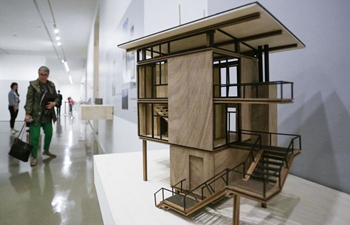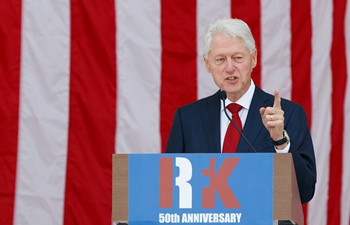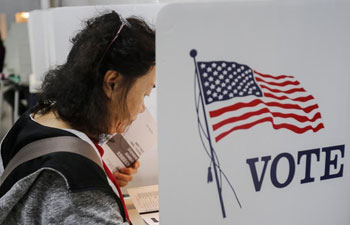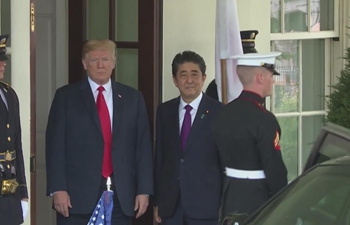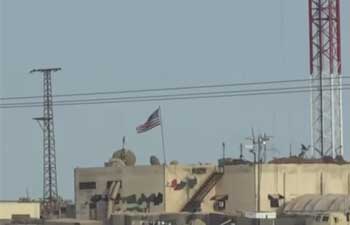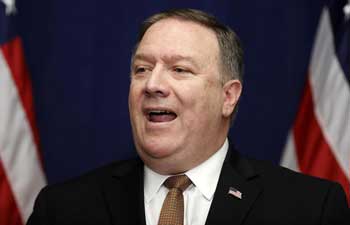WASHINGTON, June 8 (Xinhua) -- U.S. Secretary of State Mike Pompeo has given interviews to three foreign media outlets over the Korean Peninsula issue, saying that China "certainly" has a role to play over the issue.
CHINA "CERTAINLY" HAS ROLE TO PLAY
According to the transcripts provided by the State Department on Friday, Pompeo said in the interviews that "China will certainly have a part" on relative issues, including the ultimate ending of the state of war on the Korean Peninsula.
"I'm very confident that China will play a role. Indeed, they have already to date," said Pompeo.
China has already been part of it, as Chinese President Xi Jinping and Kim Jong Un, top leader of the Democratic People's Republic of Korea (DPRK), have met for discussions, said Pompeo.
Pompeo will head to China on June 14 after the meeting between U.S. President Donald Trump and Kim. This will be Pompeo's first trip to China as U.S. secretary of state.
"I'm very much looking forward to my trip to Beijing. I've been to Beijing many times in my life before, before I entered government, so I'm looking forward to returning," he said.
"I'm looking forward to meeting with China's senior leaders to talk about exactly the relationship between our two countries," he said.
"They are two big economies, two important places in the world, and we have lots of connectivity, and there are places we have challenges," the top U.S. diplomat noted.
"There are many places where China and the United States will do great things together. There are other places where the two countries are competing," he said.
"Our job as diplomats -- mine as the Secretary of State and my Chinese counterparts -- is to work so that it's not a zero-sum game between our two countries, where we can succeed together," he added.
Pompeo said that he will also share with China how the Trump-Kim meetings go.
HOPING FOR "FUNDAMENTAL SHIFT" IN U.S.-DPRK TIES
Pompeo said in the interviews that the exact timing and modalities of the denuclearization of the peninsula have not been agreed to yet, but the U.S. side has expected "a fundamental shift" in the relationship with the DPRK.
"Our objective for the summit is very clear: We want to achieve a fundamentally different strategic relationship between our two countries," he said.
"President Trump has been very clear all along that he is prepared to provide North Korea (the DPRK) with the security assurances, the warm political relationships that they want and are demanding in exchange for actions by North Korea, the denuclearization of the peninsula."
"We're hoping to make just as much progress on that as we can during the summit," he said. "And then along with our partners -- China, Japan, South Korea -- we can all move forward together."
As for the timeline of the denuclearization, Pompeo only said that Trump and Kim will discuss it during the meeting.
"Chairman Kim told me directly that he was prepared to sit with President Trump and talk about how that denuclearization would take place. The two of them will have a chance to have an extensive conversation surrounding that," he said.
"When you think about complete denuclearization, it would certainly be all of their sites, not just those that have been declared," he said.
"I would hope that there would be a statement that they would put out that each could agree to. But we'll have to see," he added. "The ultimate resolution of the problem will take lots of willing partners."
SECURITY ASSURANCES AND ECONOMIC ASSISTANCE LINKED
Pompeo noted that Trump and Kim will "begin to flesh out what both the security assurances will look like, what we can do together politically to provide better relations between our two countries, and then talk about denuclearization."
He also said that foreign economic assistance and security assurances to Pyongyang "are incredibly linked."
"For North Korea to have the security assurances it needs, it needs to know that it has an economic -- economically viable path forward ... it's difficult to separate them out," he said, adding that he imagines many nations, besides the DPRK's neighbors, will want to participate in its economic development "if we are successful in Singapore."
"It would be our expectation that the countries in the region would provide the initial financial support for just that; but over time, we would hope that, much like the other countries in the region, it would be able to achieve exactly what I described -- a connected, safe, secure North Korea without outside assistance," he added.
"It would be the opening up of the country, it would be their connectedness, it would be their ability to prosper on their own feet," he explained.
However, the foreign assistance, "much like the economic opening that will take place, it will only take place at such time as we have completed the denuclearization," he said.
He also reiterated that U.S. sanctions on the DPRK will not be lifted "until such time as the denuclearization itself has been completed."
"The economic relief, the sanctions relief ... can't take place until we see real action, real change, on the part of North Korea," he said.








